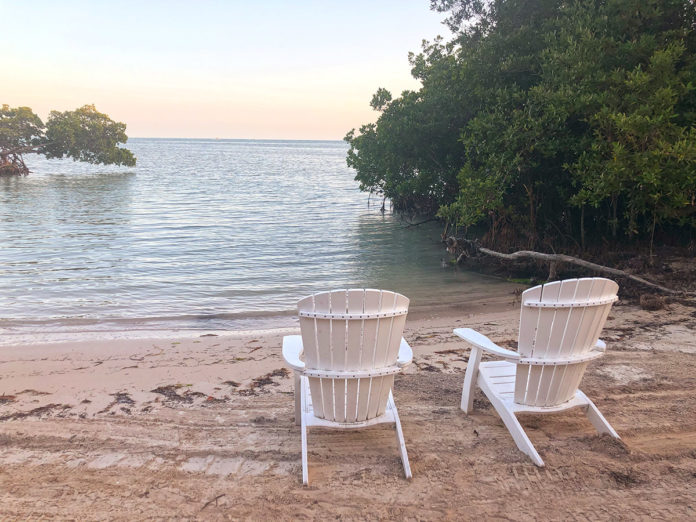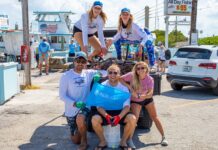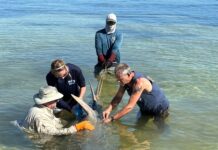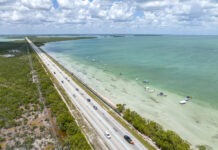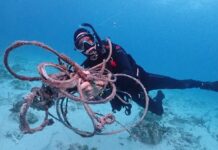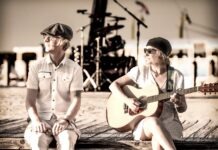At the end of a dirt road on the edge of Stock Island, bees buzz and bonfires burn.
Island Farm at Lost Beach, previously known only to lucky kayakers and a few locals, is finally opening its shores and sharing the sweetness through Fire + Honey, a reservation-only weekend bonfire series.
“It transports you,” said owner Eric Dickstein. “It’s funny because we meet people all the time. And they’re just like, ‘We never knew this existed.’”
Dickstein, a New Jersey native, purchased the island property 15 years ago with the intention of raising bees and ultimately creating a community-focused agriculture initiative. At present, Island Farm is home to some hundred hives, all producing mangrove honey, and spring is high time for production. “The bees get busy when the plants start to flower. We have black, white and red mangroves. Mangrove honey is notably some of the best. Because the mangroves bloom at different times we get an extended season,” Dickstein said. The Island Farm Honey produced on site is offered to bonfire guests as a welcome addition to a traditional s’more.
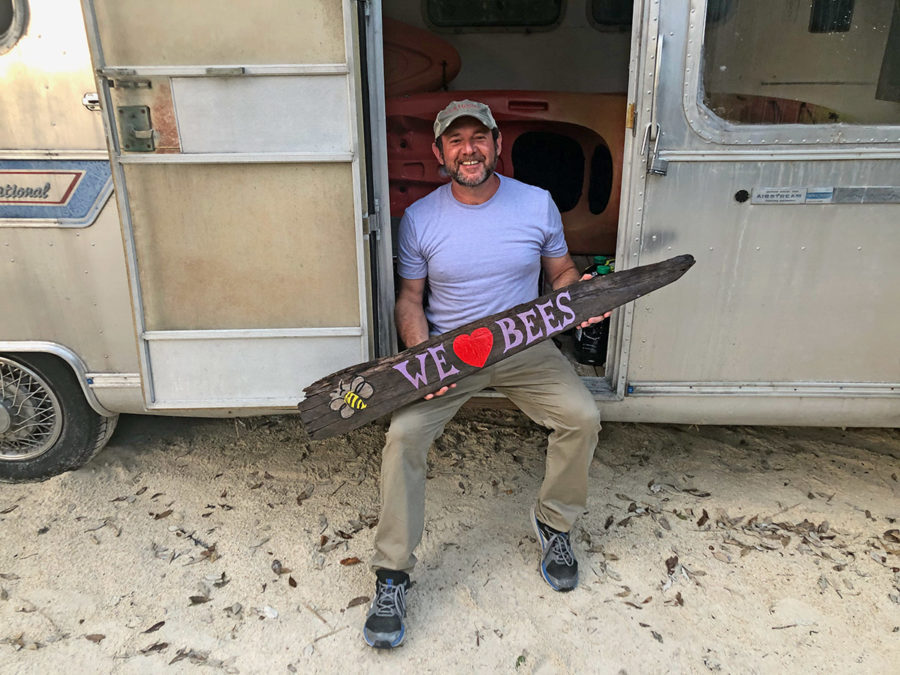
Island Farm deals equally in sweetness and sustainability. An off-the grid property, nothing goes to waste. “There’s no ocean debris that leaves the island. We’re even using the seaweed. It dries, composts and helps with soil nitrogen. It’s a natural fertilizer. We use everything. The ash from the bonfires helps with the alkalinity in the soil and reduces bugs around the hives. Everything is a complete system,” Dickstein said.
The model of cyclical support is mirrored in the Fire + Honey bonfire events. The weekend revelry acquaints the community with Island Farm and subsidizes the high cost of farming. “The agricultural side is very expensive. These events get people to come out, try the honey and get to know us while getting out into nature. It also supports our beekeeping and planned growth.”
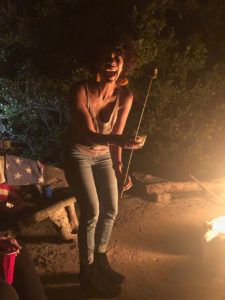
Restoring the natural beauty of Lost Beach was a labor of love for Dickstein and his crew. “We’ve removed about 60 Dumpsters of garbage and plastic so far.” The resulting postcard-pretty appearance inspired the name Lost Beach. “We call it the Lost Beach because it was lost and now we’ve found it.”
The finding couldn’t have come at a better time. “There’s a big movement in the state towards agrotourism. This is the perfect spot for that and with COVID restrictions, the community needs more outdoor things like this so we’re not just a one-horse town.”
Dickstein developed the Fire + Honey concept in collaboration with Jenn Stefanacci, owner and queen bee of downtown libation staple 22&Co. “Jenn is an amazing overachiever. She made the time and shared the vision. She’s been the most passionate person I’ve met. She just gets it.”
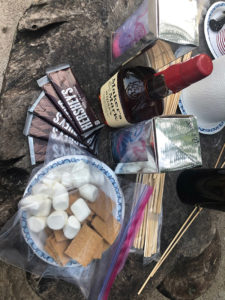
The getting was easy for Stefanacci, who saw the property’s unique potential. “I moved to Key West 11 years ago and now I have to leave to relax. Out here I can do that. It’s different than anywhere in the Keys. Lost Beach brings me back to why I moved here in the first place.”
Appreciation for the Keys community is reflected in event pricing, offering locals a discounted rate. “Locals keep this island going, after hurricanes, during September, you have to remember who the heart and soul of this island is,” said Stefanacci.
Bonfires are just the beginning for Lost Beach. It’s BYOB for now, but Dickstein will soon partner with Keys Meads to create an outdoor mead garden and tasting area. The collaboration stands to benefit both businesses, with Dickstein providing the honey used in mead production. In the immediate future is a farm store aptly named The Sweet Spot, and beginning next month, a weekend market. Dickstein encourages artists and vendors interested in being a part of the market to apply via the Island Farm website.
Also in the works for Island Farm at Lost Beach: farm to table dinners, beekeeping workshops and, come summertime, a farm camp to get kids excited about agriculture. “We want to give parents a chance to bring their kids somewhere they can be safe, have fun outside, unplug and get back to their roots.”
While expansion ideas abound, simplicity is Dickstein’s ultimate aim. “What we’re trying to do is simple — chairs, fire, honey. I think people appreciate that. We let nature do the work.”
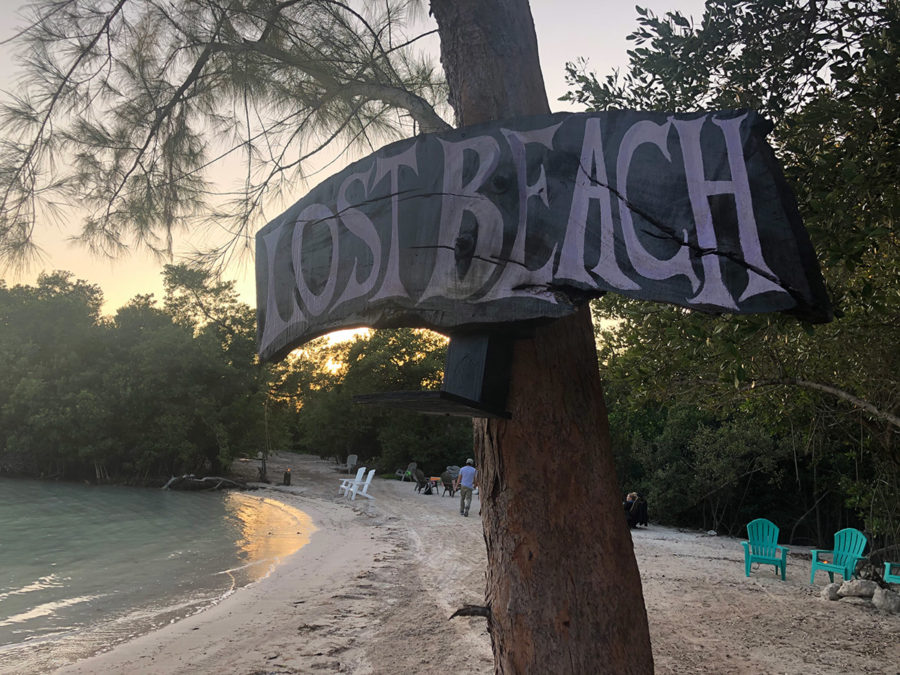
For Dickstein, community is key and local volunteers are not only welcome but wholly necessary. “It’s a big piece of property, and there’s a lot we want to do. It’s going to take a lot of hands. The idea is to make the farm and the beach accessible to more people. Hopefully they’ll ask, ‘How can we help? How can we get involved?’”
Visitors and volunteers alike are offered the gift of ancient camaraderie. “Something special happens when people are sitting around a fire. You connect. It’s elemental.”
To learn more and to connect with those elements, book a Fire & Honey experience through Island Farm’s website at islandfarmhoney.com.















